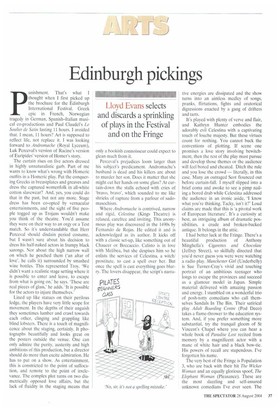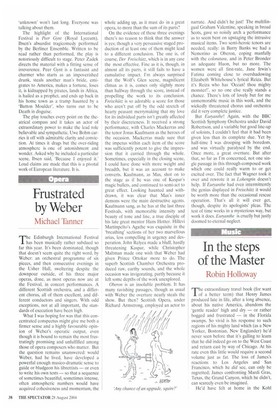Edinburgh pickings
Lloyd Evans selects and discards a sprinkling of plays in the Festival and on the Fringe
punishment. That's what I thought when I first picked up the brochure for the Edinburgh International Festival. Greek epic in French, Norwegian tragedy in German, Spanish–Italian musical co-productions and Paul Claudel's Le Soulier de Satin lasting 11 hours. I avoided that. I mean, 11 hours? Art is supposed to reflect life, not replace it. I was looking forward to Andromache (Royal Lyceum), Luk Perceval's version of Racine's version of Euripides' version of Homer's story.
The curtain rises on five actors dressed in highly unnaturalistic garb. Part of me wants to know what's wrong with Homeric outfits in a Homeric play. Put the conquering Greeks in breastplates and greaves and dress the captured womenfolk in all-white cotton slavewear? And, yes, you could do that in the past, but not any more. Stage dress has been co-opted by vernacular entertainments, and the sight of five people togged up as Trojans wouldn't make you think of the theatre. You'd assume they were on their way to an orgy or a Test match. So it's understandable that Herr Perceval should disdain period costume, but I wasn't sure about his decision to dress his half-naked actors in frumpy black sarongs. Nor about the high narrow wall on which he perched them Can altar of love', he calls it) surrounded by smashed wine bottles. This represented Troy. 'We didn't want a realistic stage setting where it is possible to enter and leave, to escape from what is going on,' he says. 'These are real pieces of glass,' he adds. 'It is possible for the actors to injure themselves.'
Lined up like statues on their perilous ledge, the players have very little scope for movement. In the depths of their anguish they sometimes lumber and crawl towards each other, clinging and grappling like blind lobsters. There is a touch of magnificence about the staging, certainly. It photographs beautifully and looks great on the posters outside the venue. One can only admire the purity, austerity and high ambitions of this production, but a director should do more than excite admiration. He has to put on a show. As entertainment, this is constricted to the point of suffocation, and remote to the point of irrelevance. The complex plot turns on two diametrically opposed love affairs, but the lack of fluidity in the staging means that only a bookish connoisseur could expect to glean much from it.
Perceval's prejudices loom larger than his subject's predicament. Andromache's husband is dead and his killers are about to murder her son. Does it matter that she might cut her hands on some glass? At curtain-down the stalls echoed with cries of 'bravo, bravo', which sounded to me like shrieks of rapture from a parlour of sadomasochism.
Where Andromache is contrived, narrow and rigid, Celestina (Kings Theatre) is relaxed, carefree and inviting. This anonymous play was discovered in the 1490s by Fernando de Rojas. He edited it and is acknowledged as its author. It kicks off with a classic set-up, like something out of Chaucer or Boccaccio. Calisto is in love with Melibea, but she despises him so he enlists the services of Celestina, a witch/ prostitute, to cast a spell over her. But once the spell is cast everything goes blurry. The lovers disappear, the script's narra
Live energies are dissipated and the show turns into an aimless medley of songs, pranks, flirtations, fights and oratorical digressions enacted by a gang of drifters and tarts.
It's played with plenty of verve and flair, and Kathryn Hunter embodies the adorably evil Celestina with a captivating touch of louche majesty. But these virtues count for nothing. You cannot buck the conventions of plotting. If scene one promises a love story involving bewitchment, then the rest of the play must pursue and develop those themes or the audience will feel bored and cheated. Ditch the rule and you lose the crowd — literally, in this case. Many an outraged Scot flounced out before curtain-fall. I myself slipped into a brief coma and awoke to see a pimp nailing a bored drab while Celestina addressed the audience in an ironic aside, 'I know what you're thinking. Tacky, isn't it?' Loud claims are made that this is 'a pivotal work of European literature'. It's a curiosity at best, an intriguing album of dramatic possibilities, a crude and broken-backed antique. It belongs in the attic.
I had better luck at the Fringe. There's a beautiful production of Anthony Minghella's Cigarettes and Chocolate (Jeffrey Street), so skilfully directed that you'd never guess you were were watching a radio play. Manchester Girl (Underbelly) is Sue Turner-Cray's vivid and touching portrait of an ambitious teenager who longs to escape the provinces and succeed as a glamour model in Japan. Simple material delivered with amazing passion and energy. I stumbled on a wonderful trio of posh-totty comedians who call themselves Sandals In The Bin. Their satirical play Adult Boarding Centre (Pod Deco) takes a flame-thrower to the education system. And, if you prefer something more substantial, try the tranquil gloom of St Vincent's Chapel where you can hear a whole book of Paradise Lost recited from memory by a magnificent actor with a mane of white hair and a black bow-tie. His powers of recall are stupendous. I've forgotten his name.
The very best of the Fringe is Population 3, who are back with their hit The Wicker Woman and an equally glorious spoof, The Elephant Woman (Pleasance). These are the most dazzling and self-assured unknown comedians I've ever seen. The
'unknown' won't last long. Everyone was talking about them.
The highlight of the International Festival is Peer Gynt (Royal Lyceum), Ibsen's absurdist tragicomedy performed by the Berliner Ensemble. Written to be read rather than performed, the play is notoriously difficult to stage. Peter Zadek directs the material with a fitting sense of irreverence. Peer Gynt is a fantasist and charmer who starts as an impoverished drunk, steals another man's bride, emigrates to America, makes a fortune, loses it, is kidnapped by pirates, lands in Africa, is hailed as a prophet, and ends up back in his home town as a tramp haunted by a 'Button Moulder', who turns out to be Death in disguise.
The play touches every point on the theatrical compass and it takes an actor of extraordinary power to make the lead role believable and sympathetic. Uwe Bohm carries it off with admirable clarity and conviction. At times it drags but the over-riding atmosphere is one of astonishment and wonder. Asked why he included a particular scene, Ibsen said, 'Because I enjoyed it.' Loud claims are made that this is a pivotal work of European literature. It is.



























































 Previous page
Previous page